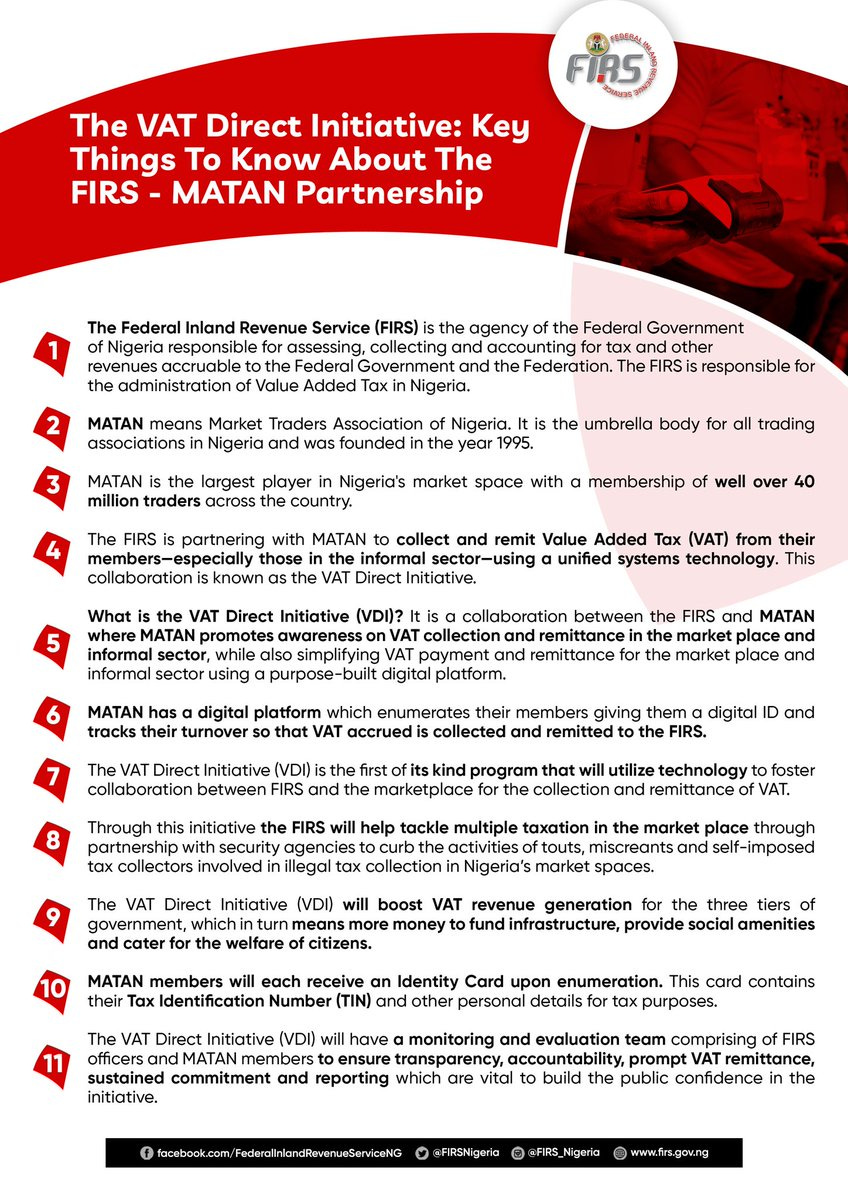Nigeria Reform Update: Nigeria's Tax Reforms Target Informal Traders
Nigeria's bold move to collect VAT from informal traders: a tad too soon and an illegality, I argue..

Nigeria’s Federal Government (FG) through its revenue collection agency, the Federal Inland Revenue Service (FIRS) is targeting taxing the country’s informal economy as it pushes to bolster tax revenues.
Nigeria, with some of the lowest tax collection rates in the world, at around 10.8% of the GDP - newly revised by the FIRS and the National Bureau of Statistics (NBS), is keen to significantly reduce increase tax revenues particularly for Value-Added-Tax (VAT - 7.5%) after revenues from VAT and Company Income Tax (CIT) shrunk by 18.6% in Q1 2023.
It is important to note that Nigerians do have a low tax morale - one of the lowest in the world, with survey results from a Bill & Melinda Gates Foundation funded Nigeria Tax & Subsidy Perception Study in 2018 estimating that “only 17% of individuals and 31% of businesses believe that they should pay their taxes correctly.”

According to the FIRS, it will partner with arguably Nigeria’s largest market traders association, the Market Traders Association of Nigeria (MATAN), with unverifiable claims of up to 40 million market traders as members, to collect and remit VAT from its members using a unified systems technology.
Yesterday, on News Central TV Africa (hit the hyperlink if you want to watch), I argued that this new tax campaign was one ‘policy reform direction’ too soon, and a move toward eliciting short-term negative impacts on the economy. There are strong legal arguments et battles against Nigeria’s federal government collecting VAT instead of the respective states in the country too.
While tax revenues are essential for the country's development, it is important to critically evaluate the potential consequences of such a decision.
Some short Nigeria tax history, and federalism lesson here:
Before VAT, Nigeria operated the Sales Tax, which was administered by the states. In 1993, the military scrapped the Sales Tax, converted it to VAT, and designated it as a federal tax. This change allowed VAT to be shared with all 36 states.
However, I still hold strong opinions that by equity and tax jurisprudence, VAT should only be collected by the states and local government areas (LGAs) and retained by them.
And the core reason is that centralizing VAT is the principle of state autonomy, at least by Nigerian idealistic parlance. States generate their own internally generated revenue (IGR) through various means, including taxes. VAT, being based on the consumption of goods and services within a state, should naturally remain with the states. Sharing VAT revenue erodes the fiscal autonomy of the states and hampers their ability to effectively address their unique development needs.
It is a tad too soon - especially with the recent price shocks:
Since taking over office in May 2023, Bola Ahmed Tinubu’s presidency has embarked on a sweeping flurry of “tough” but badly needed macroeconomic policy reforms causing social anxiety and prices to spike across Nigeria in the time-frame since the policy implementations till date.
The informal economy is a vital part of Nigeria's economic make-up, providing livelihoods and contributing to economic growth. It is responsible for at least 93% of employment in Nigeria according to the International Labour Organization (ILO) and has the size of at least 57% of Nigeria’s GDP according to World Economics.
It is also only just recovering from dire consequences of Nigeria’s now back-tracked botched demonetization policy.
Targeting informal traders with VAT will impose additional burdens on their already shrinking margins et resources. It will also deter their productivity and hinder the overall growth of the informal economy.
Nigeria's tax system is already complex and burdensome. According to “Big Four” sources in Nigeria, there are currently 60 different taxes in Nigeria, and unofficially, it is reported that there are as many as 200 different taxes. This multiplicity of taxes places a heavy compliance burden on micro-businesses, especially those in the informal sector. Introducing VAT on top of this already complex tax regime would further burden informal traders.
In summary:
My thoughts on the new federal VAT collection policy direction for the informal economy in Nigeria is summed up this way:
- It is too soon, considering the price shocks.
- It is unconstitutional; states should collect VAT.
- I'm wary of the FIRS-MATAN deal - *coughs coughs, remember Lagos State and the Alpha Beta saga?


